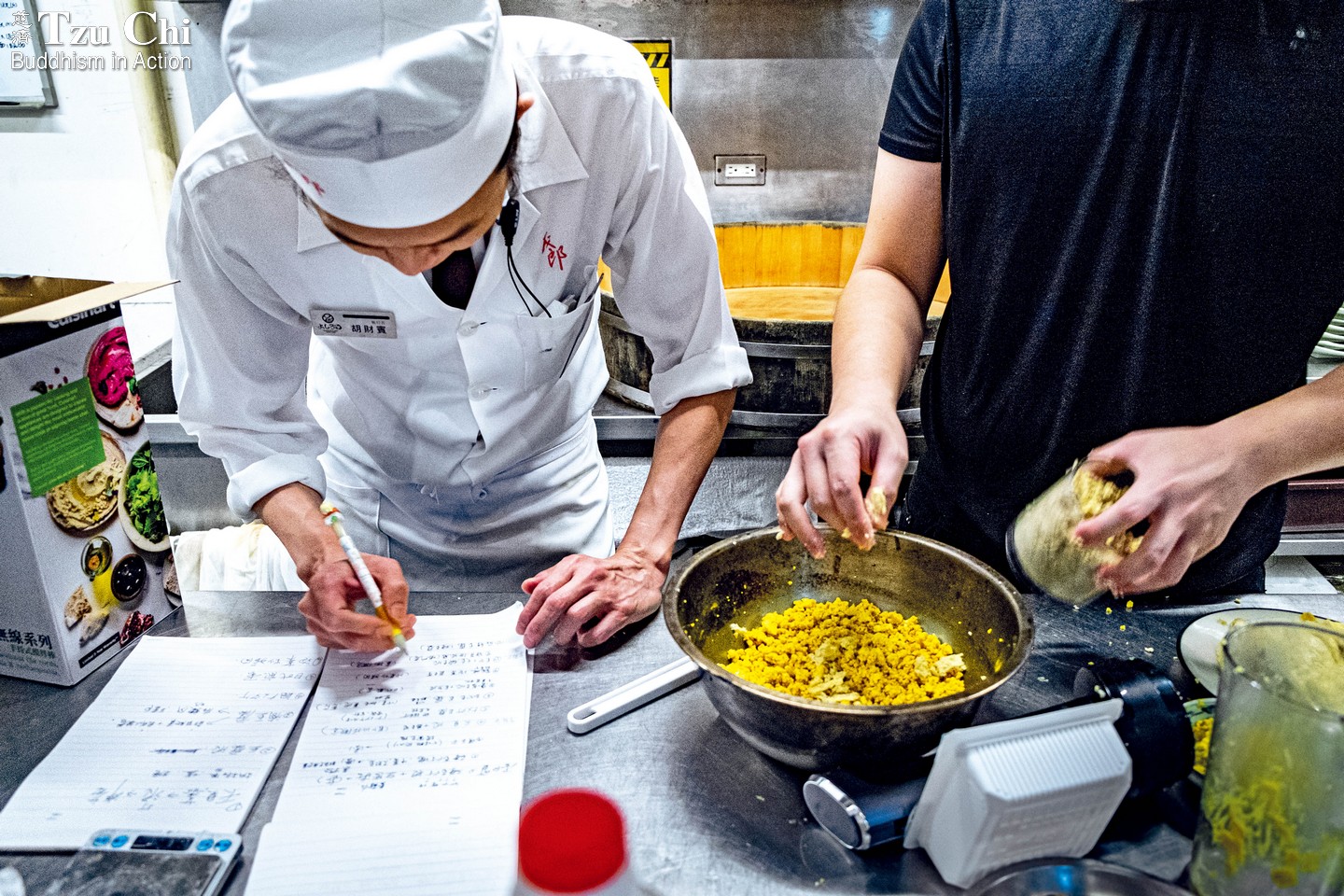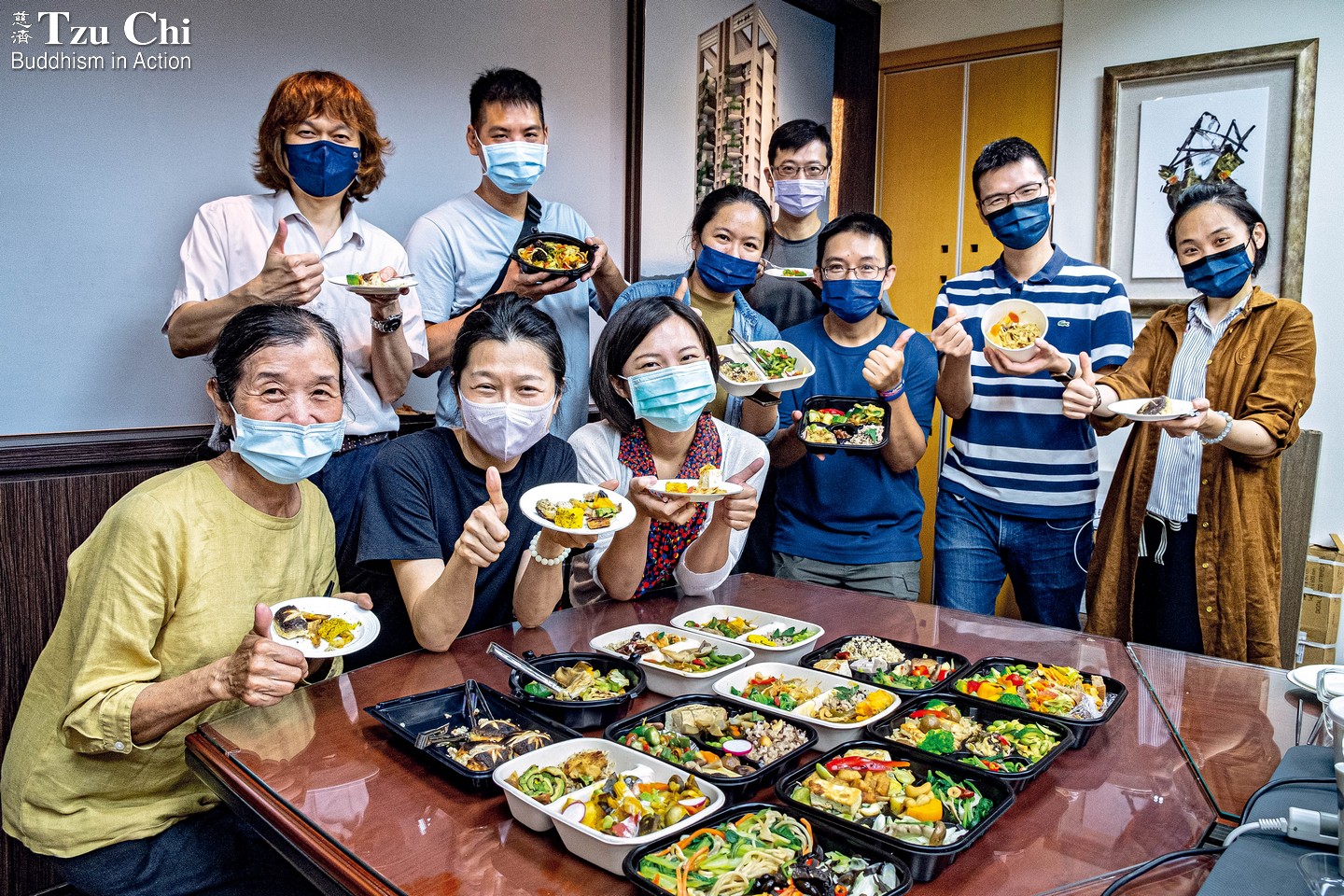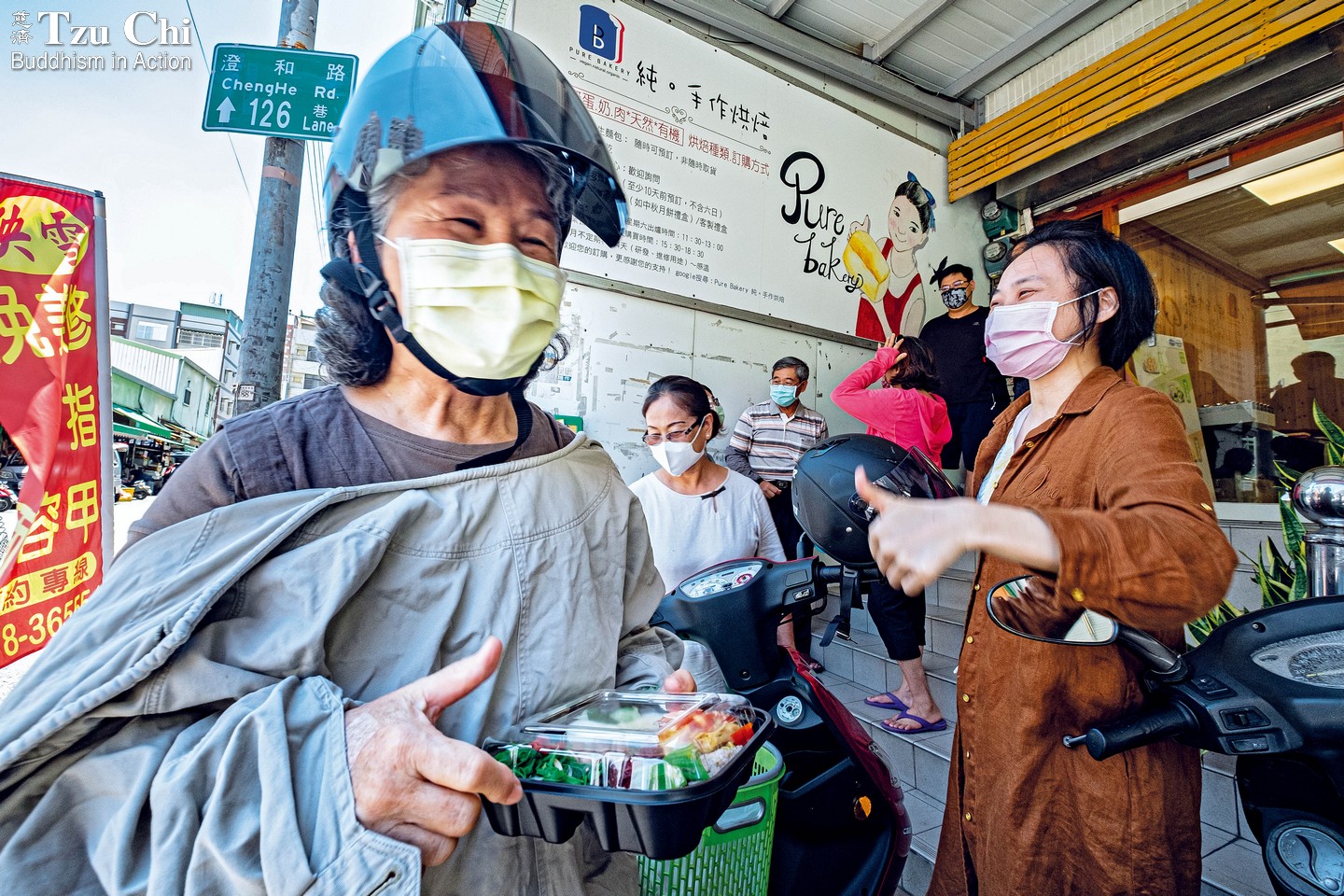Make Health a Habit
By Liao Zhe-min
Translated by Wu Hsiao-ting
Photos by Huang Xiao-zhe
Wanting to be healthier, they signed up for a 21-day whole-plant diet program. Their menus featured a lot of whole grains, protein, vegetables, and fruit, but very little oil, salt, or sugar. The diet took some getting used to, but worked in a big way!
Ms. Lin is an office worker. She loves bread and fried food. Her cholesterol has been on the high side for a long time. Her family tells her not to worry about it too much—that it is hereditary—but she is of a different mind. “I don’t want to take medication on a long-term basis, but I want to be healthier. There are still many things I want to do.” Mrs. Kao is a breast cancer survivor with gastrointestinal issues. Her triglycerides are often too high too, so she needs to stay on meds to manage her conditions. Mr. Shen, 60, works in construction. He often had social dinners with his clients throughout his career, smoking and drinking and eating rich food. His triglycerides are staggeringly high.
They all want to be healthier. That’s why they accepted the invitation of Tzu Chi volunteers in Kaohsiung, southern Taiwan, and enrolled in a 21-day health challenge. The challenge was to maintain a whole-plant diet low in oil, salt, and sugar. They also were encouraged to avoid refined processed food, eggs, and milk. The goal of the challenge was to boost their health by having them eat healthier, tame their desire for heavily seasoned food, drink plenty of water, and exercise more.
The palates of most program participants were unaccustomed to such a diet when they started. The food was a lot milder than what they had been used to. But after just a week, they were amazed by the changes they had noticed in themselves: “It has become easier for me to fall asleep at night”; “I don’t get tired so easily now”; and “My endurance and energy have improved.” These positive, uplifting changes were like a shot in the arm and empowered them to finish the program.

Participants in the 21-day health challenge program arrive every day at noon and in the early evening at a designated venue to fetch their boxed meals.
Numbers can talk
At the end of the 21 days, many participants saw their health numbers markedly improve or settle back within the normal ranges. For example, Ms. Lin’s low-density lipoprotein cholesterol—the so-called “bad” cholesterol—dropped from 188 to 117 mg/dl. She was so happy she signed up for another round of the program. She also inquired whether the program provided food ingredients packages or recipes with which she could maintain a whole-plant diet until the next 21-day challenge began.
Mr. Shen was also pleasantly surprised with his results. He had been a meat eater before the program, and had very high blood fat levels. Though he had long been taking medicine to manage his health conditions, his physician, Dr. Chen Deng-wang (陳登旺), a member of the Tzu Chi International Medical Association (TIMA), suggested that he join the health challenge program. When Shen saw the results of his blood tests after the 21-day challenge, he could hardly believe his eyes and exclaimed: “How is this possible?!” His triglyceride levels had plummeted from 1,800 to an unprecedented 740. Those record numbers prompted him to sign up for a second round of the program in no time.
Zhuang Zhang-quan (莊章銓), another participant, is a medical technician who helped perform the blood tests for program participants. Like the others, he was amazed by the benefits of the health challenge. He is nearly 60. Before the challenge, he tended to get short of breath when he crouched down, he was having more and more gray hair, and age spots were cropping up on his skin. After he joined the program, however, he noticed a decrease in his white hair and an increase in his black hair, his age spots became paler, and his fingernails became smoother and shinier. He also lost three kilograms (6.6 pounds). “Over these 21 days,” he said, “I’ve felt very energetic, and my stomach and intestines have been in great working order. Every inch of my skin, from the top of my head to the bottom of my feet, has felt a marked difference.”
He added that when his family noticed he was avoiding processed and heavily seasoned food, they followed his example and began eating more healthy too. His wife lost two kilograms as a result, and their children’s health even improved slightly.
Positive feedback from participants greatly encouraged the volunteer team that launched the program. It energized them to continue to carry out the program, in partnership with restaurants, TIMA doctors, and dieticians. Their frequent interactions with participants gave them useful information on how everyone liked the meals and what changes participants were noticing in themselves. Like the participants, they were not disappointed in the results.
How it started
According to statistics released by Taiwan’s Ministry of Health and Welfare, chronic illnesses made up over half of the top ten leading causes of death in Taiwan in 2020. Such illnesses include cardiovascular diseases, cerebrovascular diseases, diabetes, and hypertension. Sufferers of chronic illness are also more likely to get very sick with COVID-19. Unhealthy diets are a major risk factor that has been proven to contribute to these chronic diseases.
In June this year, Ou Yu-jing (歐于菁), a Tzu Chi volunteer in Kaohsiung, learned about a project organized by her counterparts in Malaysia: the Healthier Me 21-Day Challenge. The goal of the Malaysian project was to help people improve their health through a whole-food, plant-based diet. After seeing the “before and after” health numbers of participants, one veteran doctor in Malaysia with 20 years of experience said that she had never seen so much improvement, in so many people, in such a short time.
Ou was impressed with the results in Malaysia and decided to start the same program in Taiwan. She organized a team which was further split into groups in charge of food quality control, administrative work, medical affairs, coordination, etc. She launched the program in Taiwan in late June 2021.
As its name suggests, each round of the challenge lasts 21 days. Participants are provided boxed meals for lunch and dinner, Monday through Friday, over the course of three weeks. Before the first 21-day round kicked off, Ou and Cai Ya-chun (蔡雅純), another Tzu Chi volunteer, conferred with dieticians and the chefs from three restaurants on the production of the boxed meals. Aside from ascertaining that the proportion of nutrients met the criteria, they also sampled the dishes and discussed the ingredients and flavors.
Allowing no artificial condiments in such a diet posed quite a challenge to the participating chefs. Ou was moved to see how the chefs would help each other out every time one of them encountered a problem. “I saw in our group chat that every time a chef raised a question, another would try to provide a solution.” Many difficulties and challenges were overcome this way.

A chef prepares food for the program.
The program’s whole-plant diet is made up of four food groups: whole grains, proteins, vegetables, and fruit. Each food group comprises a quarter of the diet, but the amount of vegetables is allowed to exceed that of fruit. Program dietician Huang Mei-hua (黃美樺) said that their team was originally very strict with everything. For example, she said, “We used a scale to measure the weight of each dish so we could decide whether the proportion of nutrients met our requirements.” However, because the number of boxed meals the program had to provide every day was large, measuring the weight of each dish was too much work, so in the end they decided to go by bulk instead of weight. Ou said that because fruit does not keep well in hot weather, the fruit in the program is prepared by the participants themselves.
The program only provided lunch and dinner, but what about breakfast? Program volunteer Wang Jin (王瑾) explained that their team sent out recipes designed by dieticians early every morning to each participant to give them some breakfast ideas. Participants were also encouraged to share with others in the program what they had for breakfast so that everyone could learn from each other. On the weekends, when no meals were provided, participants could refer to cooking videos recorded by volunteers to prepare their own meals. Participating restaurants also provided ready-to-heat packaged meals or food ingredients packages for participants so that they wouldn’t be at a loss for what to eat on the weekends.
The program emphasizes the importance of exercise too. To help participants shape up, volunteers invited Zeng Ying-jia (曾英嘉), who once taught physical education in high school, to instruct participants online how to stretch their bodies and strengthen their core muscles. “I’ve followed the instructor’s workout demonstrations several times,” said volunteer Cai Ya-chun, “and after just a few minutes I began to sweat.”
Volunteer Wang Jin also sent out electronic picture cards every morning, midday, and evening to cheer participants on and to share nutritional and medical information. Examples of the messages on the cards included: “When it comes to replacing processed snacks with natural foods, bananas, apples, sweet potatoes, and edamame beans are all good choices. They are good at curbing your hunger” and “Be sure to drink plenty of water every day.”
When participants showed up at noon and in the early evening to fetch their meals, volunteer Chen Chun-xing (陳春杏), who helped extend care to participants, asked them questions such as, “How do you like the meals?” and “Have you noticed any changes in your body?” One participant said that he had lost one kilogram (2.2 pounds) in just two weeks. Another said, “I don’t feel sleepy or tired even after I have my meals. I’m full of energy to keep working.” Sometimes Chen teased participants by asking, “Do you miss cookies, white bread, or instant noodles?” Some participants answered: “You bet! But I’ll stay the course for the sake of my health.”
It’s not hard to change
An exchange session was held online every Sunday afternoon during which program participants, dieticians, and doctors met. During such sessions, dieticians shared knowledge and information on subjects such as how to understand food ingredients and nutritional labels, and participants could raise any questions or concerns they had about the whole-plant diet. Many participants were used to a meat diet, so it was inevitable they were a little unaccustomed to the new diet when they first joined the program. Some, for example, said that they had noticed abdominal bloating or increased flatulence caused by eating more legumes than they had been used to. Dr. Qiu Sheng-cong (邱聖聰), a TIMA doctor, suggested that participants chew their food more finely. This would help the enzymes in their saliva work better on the food and enable their stomachs and intestines to gradually adjust to the new plant fibers, helping improve such issues.
Other participants asked how to replenish suitable nutrients after exercise. Dr. Qiu answered that a whole-plant diet would not result in a deficiency of electrolytes or minerals, but suggested using natural sea salt to replenish the electrolytes lost through sweat. One can dissolve a teaspoon of natural sea salt in every 500 milliliters of drinking water. He didn’t recommend commercial sports drinks because they don’t qualify as natural food.
Dr. Xie Ming-yu (謝明裕), who specializes in liver and gallbladder conditions, reminded program participants with a penchant for sweets, sugary drinks, and fruit: “We die without salt, but we won’t without sugar.” He also pointed out that many deep-fried or processed foodstuffs contain man-made fats, which can cause addiction, place extra burdens on the body, and even lead to fatty liver. He encouraged everyone to eat seasonal, locally grown vegetables. He pointed out that they have natural good flavors and do not require excess seasoning. He also encouraged everyone to opt for whole wheat bread, which when chewed finely allows the food’s natural good flavors to come through.

Volunteers, chefs from participating restaurants, and a dietician pose before the food they are sampling. Positive feedback from program participants has greatly encouraged the team that launched the program.
Change is not as difficult as one might think. “I believe that if we go for the right food, it will have a huge impact on our body,” said volunteer Cai Ya-chun.
By early October 2021, program volunteers had completed three rounds of health challenge, and their efforts are still on-going. They work with a mission to promote plant-based diets and help more people become healthier. In addition to Kaohsiung, the same diet challenge has been launched in Hualien, Hsinchu, and Chiayi, in eastern, northern, and southern Taiwan respectively.
“I believe no one dares say that they are ‘very’ healthy, and that they are not afraid of any illness,” said Ou Yu-jing. She believes that if the diet promoted by the program proves good for health, everyone will be willing to give it a try.
Seeing an improvement in their health numbers is a joy for participants, but an even more precious thing is the development of a health-conscious mindset.
An example is Cai Jin-ying (蔡金英), a program participant with a chronic kidney condition. She said even though she had been a vegetarian for more than a decade, her fondness for heavily seasoned food had caused her to ingest too much oil, salt, and other condiments, resulting in undue burdens on her body and causing her health to suffer. But after participating in the program, her health numbers improved, she had more energy, no longer suffered from dizzy spells, and was even sleeping better. These benefits prompted her to change how she prepared her food. Her cooking methods are healthier now; instead of frying or deep-frying her food for example, she steams or boils it. She has also cut down on the use of oil, salt, and sugar. Changes to her cooking affect not only her health, but that of her family too.
The diet program has shown that achieving optimum health is within our control. After reading this article, you may want to pause and give a second thought the next time you are adding a second dash of salt in the food you are preparing or putting sugar in that steaming cup of tea before you. You have a say in your health. You can make your own choices. After all, good health is the most precious asset one can possess. With good health, all things are possible.

Participants are happy that their health numbers have improved as a result of the 21-day challenge.



